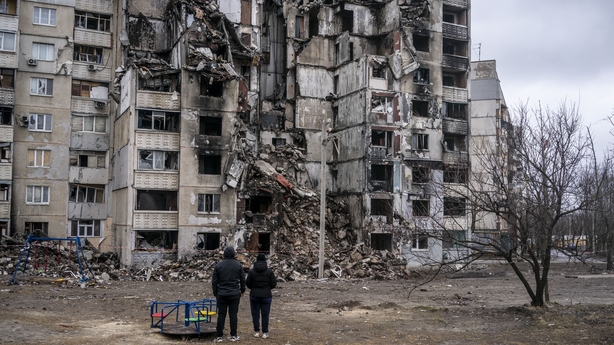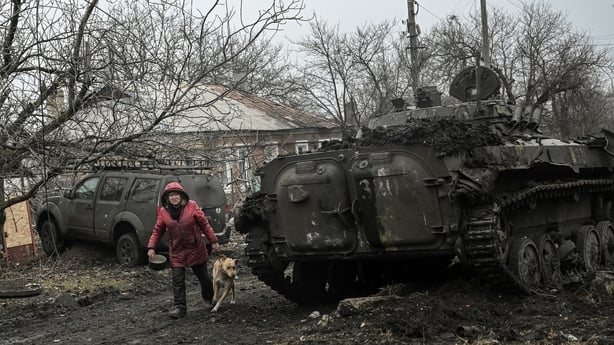The International Criminal Court is planning to seek the arrest of Russian officials for forcibly deporting children from Ukraine and targeting civilian infrastructure, according to a source today, in what would be the first international war crimes cases arising from Moscow’s invasion.
The source said the arrest warrants could include the crime of genocide, and were expected to arrive in the “short term” if approved by a pre-trial judge at the Hague-based court.
Russia would be certain to reject any arrest warrants against any of its officials. But an international war crimes prosecution could deepen Moscow’s diplomatic isolation and make it difficult for those accused to travel abroad for fear of arrest.
Russia denies deliberately targeting civilian infrastructure in Ukraine, saying its attacks are all intended to reduce Kyiv’s ability to fight. It has not concealed a programme under which it has brought thousands of Ukrainian children to Russia, but presents it as a humanitarian campaign to protect orphans and children abandoned in the conflict zone.
We need your consent to load this rte-player contentWe use rte-player to manage extra content that can set cookies on your device and collect data about your activity. Please review their details and accept them to load the content.Manage Preferences
Kyiv says thousands of deported Ukrainian children are being adopted into Russian families, housed in Russian camps and orphanages, given Russian passports and brought up to reject Ukrainian nationality and consider themselves Russians.
The UN genocide convention defines “forcibly transferring children of the group to another group” as one of five acts that can be prosecuted as genocide. Asked if the ICC charges against the Russian officials could include genocide, the source said: “It looks that way”.
Kyiv has conducted several war crimes prosecutions of Russian soldiers for individual incidents such as killings or rapes in occupied territory. The charges discussed by the ICC prosecutors could go higher, targeting officials responsible for policies rather than just perpetrators of acts on the ground.
News of the potential international charges came as Moscow appeared on the cusp of one long-sought diplomatic breakthrough: several sources told Reuters that China’s president Xi Jinping could visit Russia as soon as next week, an earlier-than-expected response to a long-standing invitation.
President Vladimir Putin has touted such a visit as a show of support, but it could be overshadowed by plans for Xi to speak by video link to Ukraine’s President Volodymyr Zelensky for the first time since the invasion. The plans for talks between President Zelensky and President Xi were reported by the Wall Street Journal and Reuters could not immediately confirm them.

Read full coverage of the Russian invasion of Ukraine
The Chinese foreign ministry did not immediately respond to requests for comment. The Kremlin said it had nothing to announce yet. Ukraine’s president’s office did not immediately respond.
“As a rule, announcements of official foreign visits are coordinated synchronously by mutual agreement of the parties,” Kremlin spokesman Dmitry Peskov told reporters. “When there is such readiness, we will let you know.”
A visit by President Xi to Russia would be a major event for President Putin, who portrays the war in Ukraine as a conflict with the combined might of the West. Russia relies on China to buy oil and gas it can no longer sell in Europe.
But a video meeting with President Zelensky could be an even bigger coup for the Ukrainians, who want Beijing to remain neutral rather than firm up support for Moscow. President Zelensky has called on President Xi to speak to him.
China has declined to ascribe blame for the war while opposing Western sanctions against Russia. It unveiled a proposal in February for a peace plan, met with scepticism in the West but praised in Moscow and cautiously welcomed by President Zelensky.
The US has said repeatedly since last month that it believes China is considering arming Russia, which Beijing denies. President Zelensky has said doing so would invite World War Three, but also that he believed Beijing was aware of such risks, implying that he doubted it was likely.
China and Russia struck a “no limits” partnership in February of 2022, weeks before Russia invaded Ukraine, and the two sides have reaffirmed the strength of their ties in public. China’s top diplomat visited Moscow in February during the week of the war’s first anniversary, when US President Joe Biden travelled to Kyiv.

On the ground, both sides described relentless fighting in Bakhmut, a small ruined city in eastern Ukraine that has become the main focus of a Russian winter campaign involving hundreds of thousands of freshly conscripted reservists and mercenaries.
Kyiv announced last week it had decided to defend Bakhmut rather than withdraw. Russian forces led by the Wagner private army have captured the city’s eastern part but so far failed to encircle it.
“All enemy attempts to capture the town are repelled by artillery, tanks, and other firepower,” Ukraine’s Colonel general Oleksandr Syrskyi, the commander of ground forces who has vowed not to withdraw, was quoted as saying by Ukraine’s Media Military Centre.
Wagner founder Yevgeny Prigozhin said yesterday the situation was “tough, very tough”.
“The closer we are to the centre of the city, the harder the fighting … The Ukrainians throw in endless reserves. But we are advancing and we will be advancing,” Mr Prigozhin said.
The months-long fight for Bakhmut has become Europe’s bloodiest infantry battle since World War Two, described as a meat grinder by both sides.
Moscow says taking it would be a major success, opening a path to capture the rest of the surrounding Donetsk region, a central war aim.
Kyiv says it has decided not to pull out because it is inflicting huge losses on the Russian assault force which will make it easier to stage a counter-attack later this year.
But some Western military analysts question whether Bakhmut is the best battlefield to take on the Russians, because of high casualties on the Ukrainian side.
“The attrition ratio in Bakhmut is worse than elsewhere,” tweeted Rob Lee, a U.S. defence expert who visited Bakhmut this month.
Latest Defence Intelligence update on the situation in Ukraine – 13 March 2023
Find out more about Defence Intelligence: https://t.co/qi9pyI0NXr
#StandWithUkraine
pic.twitter.com/hc3RfWFhvf
— Ministry of Defence
(@DefenceHQ) March 13, 2023
War crimes court cases against Russians expected
Source: Viral Trends Report


0 Comments